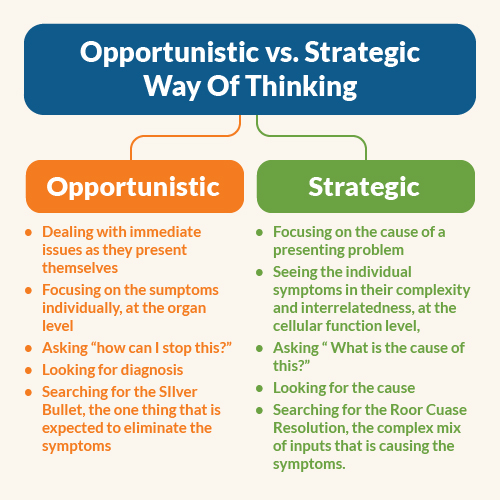The difference in thinking
The Difference In Thinking

There are two ways of thinking we recognize when it comes to solving a problem, health-related or otherwise: opportunistic (tactical) and strategic. The way you think about your own health and the way of approaching it is (or at least should be) a strategic one. You have a specific health issue and you want to overcome it. You need to have a plan, a strategy. This might include searching far and wide for the best specialist, trying as many different kinds of over-the-counter pills a possible, or even sitting with your face in your hands and crying. The medical industry holds an opportunistic view. They focus on a specific, narrowly defined health issue that you want to fix, and turn it into an opportunity for them to sell you a patented drug. They see a person in pain as a potential customer.
And unless you face the harsh truth about the real motivations of the medical industry, you will keep falling into this obvious trap and fail to get better. An opportunistic doctor looks at a patient and sees a list of symptoms, and automatically puts together a cocktail of drugs to cover, suppress, and minimize these symptoms.
For every one of these drugs (most of which come with a laundry list of side effects), the manufacturer sees dollars moving from your pocket to theirs. You then go home armed with a bottle of pills and a hole in your wallet. In the eyes of an opportunistic industry, you are good for a month, and they are sure you will come again for another prescription or a refill. This opportunity seeking industry will probably offer you the most expensive drugs possible and avoid mentioning cheaper options. Your doctor is unlikely to ask the question “what could cause this symptom?” Your doctor asks you to see him again in a month or two, and if your problems persist, he is happy to write you another prescription. Your doctor believes he can decide for you, because, well, you are not the one wearing a white coat and a stethoscope around your neck, are you? Your doctor is not motivated to listen to your concerns, ideas, or suggestions, or to consult and collaborate with another professional. But not all practitioners are like this.
A strategic (functional) doctor sees your symptoms as consequences of a deeper, underlying issue, and they are aware that without targeting the cause, the symptoms will not go away, and covering them with symptom-blocking drugs will not fix the issue, just like a band-aid will not cure the wound, and a duct tape patch will not fix a flat tire.
A Functional Medicine Practitioner creates a strategy based on your Biological
Individuality, your genetic makeup,
medical history, emotional trauma, toxic burden, nutritional deficits, past
injuries, serious infection, and current overall state of health, and comes up
with a plan that is individually tailored to fit your present situation. A
doctor with a strategic way of thinking knows that every body is different and
should be approached differently,
and they are willing to work on the plan, discuss your health with you, answer
all of your questions (because you have the right to receive all of the information about your health, and
you have a right to make informed decisions about your treatment), and they are
also willing to admit when they don’t know everything and are willing to ask
for help from other specialists. Which approach would you choose? (hint: you always have a choice)
I cannot thank you enough for the wealth of information you have given to me personally. You offered so much insight as to what is going on with me along with solutions (with links) for each concern. I am blown away at the level of help you have given to me. Thank you so much for giving so much of your time and talent to me. The information on the site alone is an enormous blessing but to have solutions available with quality products right here together is wonderful. I am sure that you are helping to change many lives for the better.
There are no comments for now.